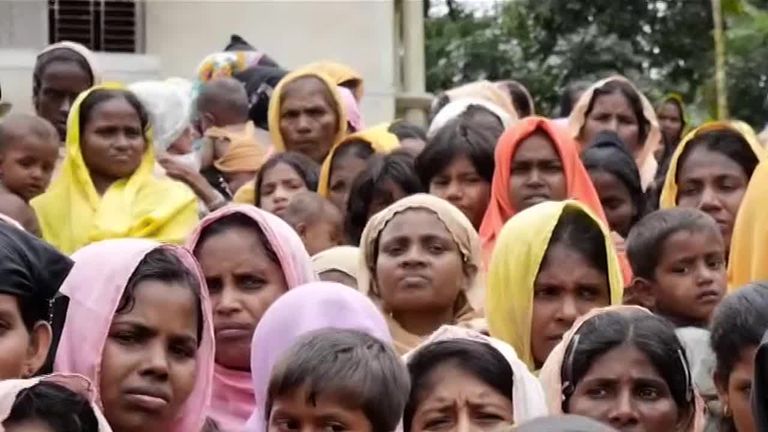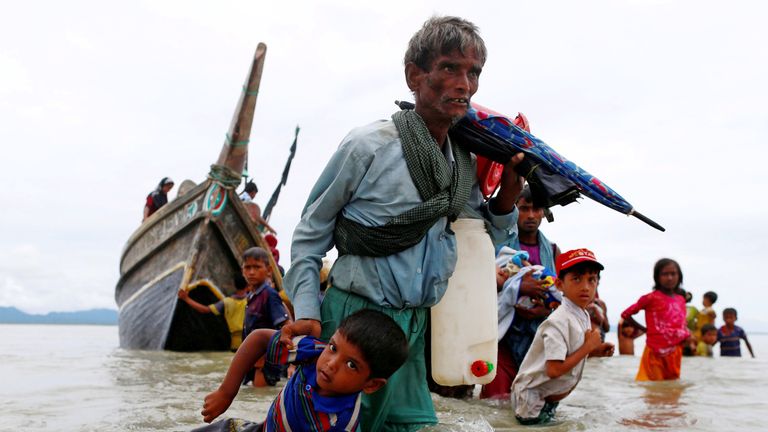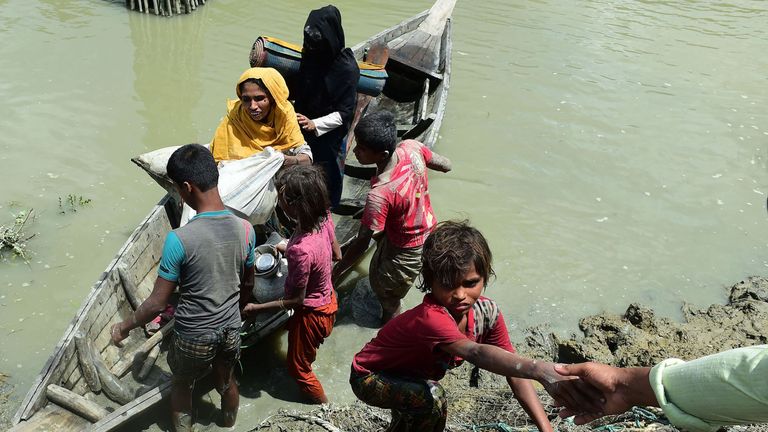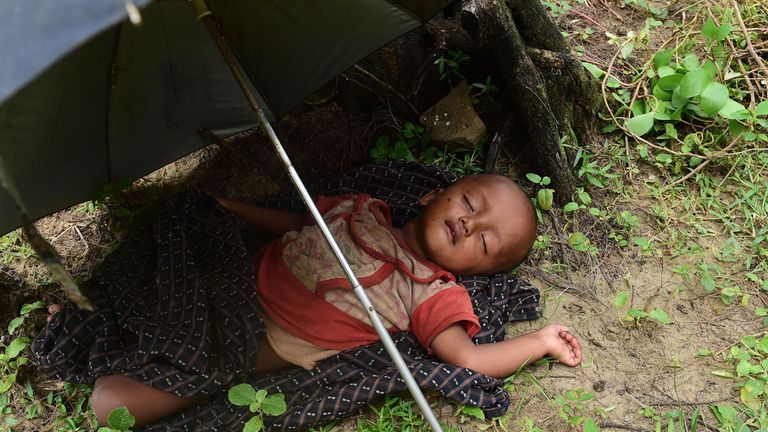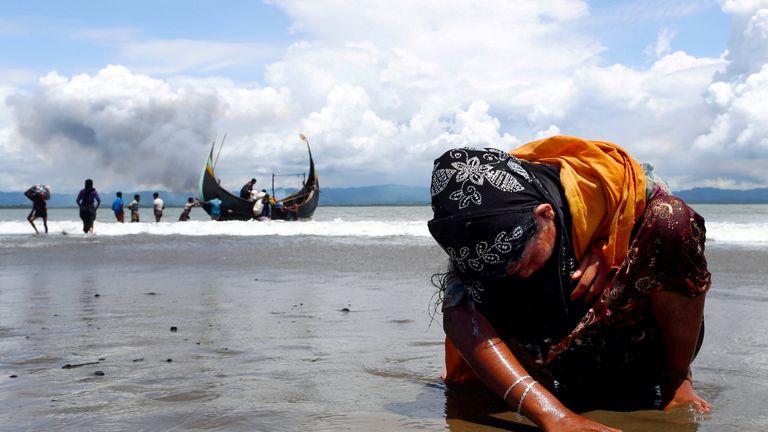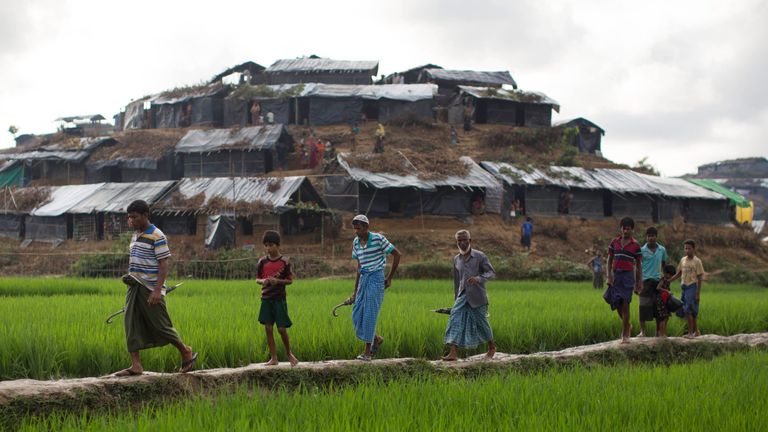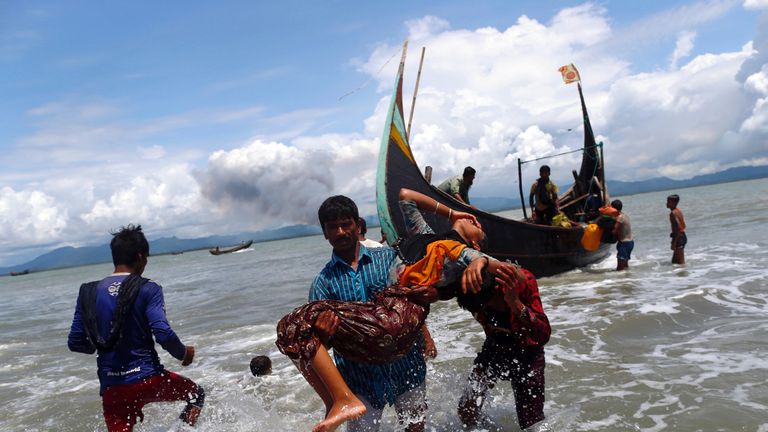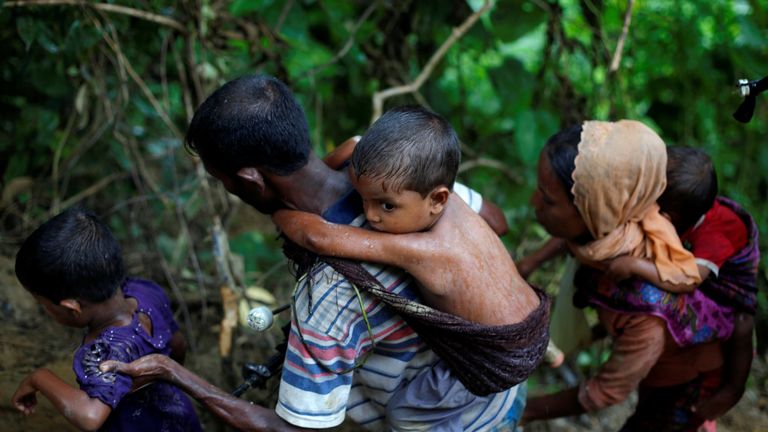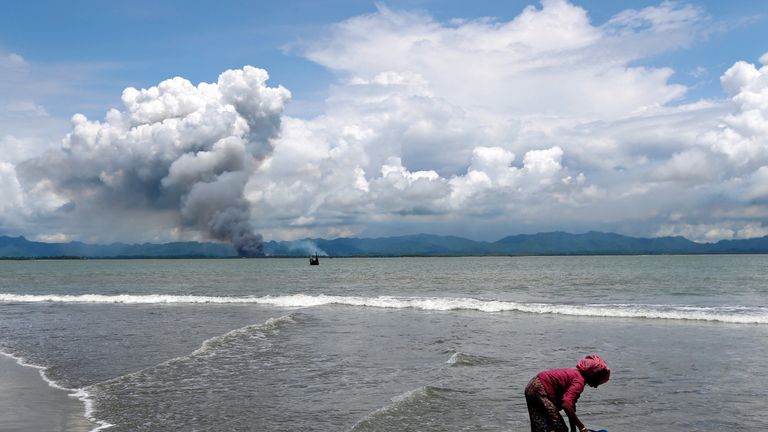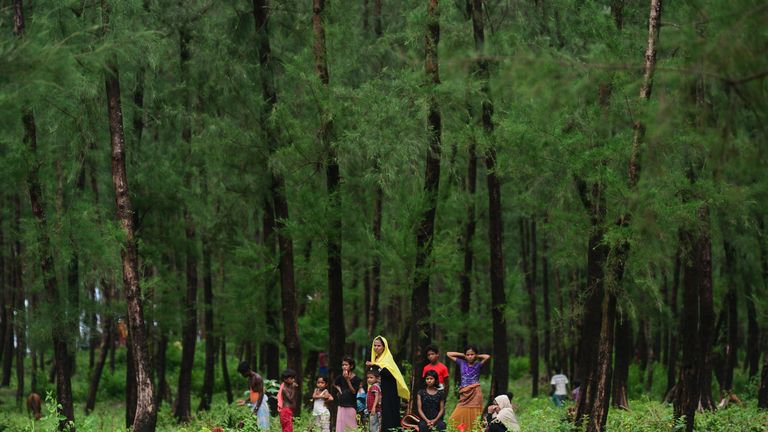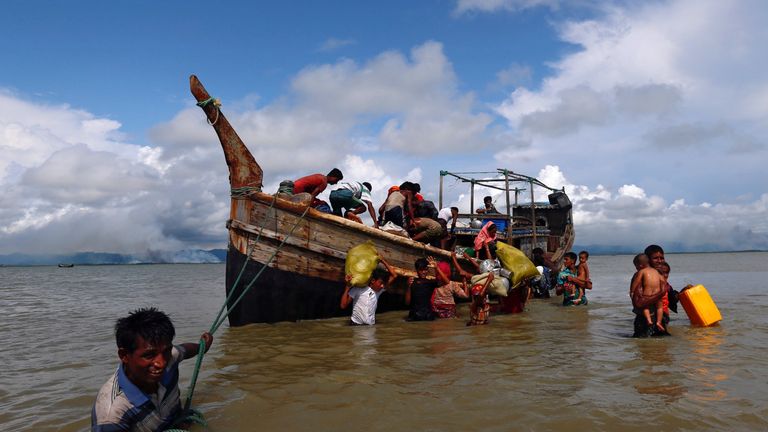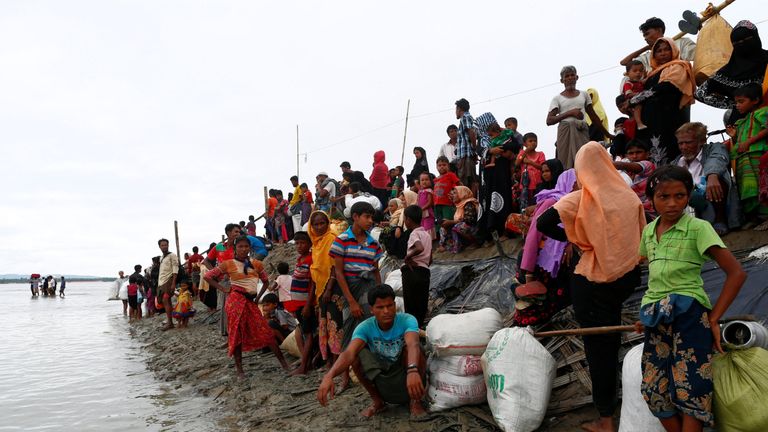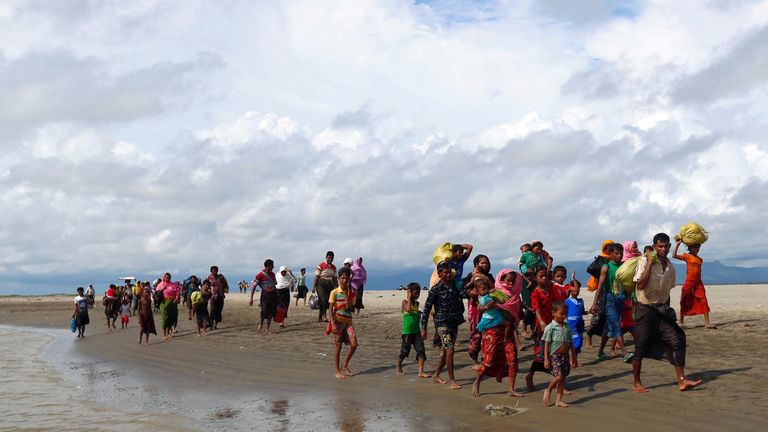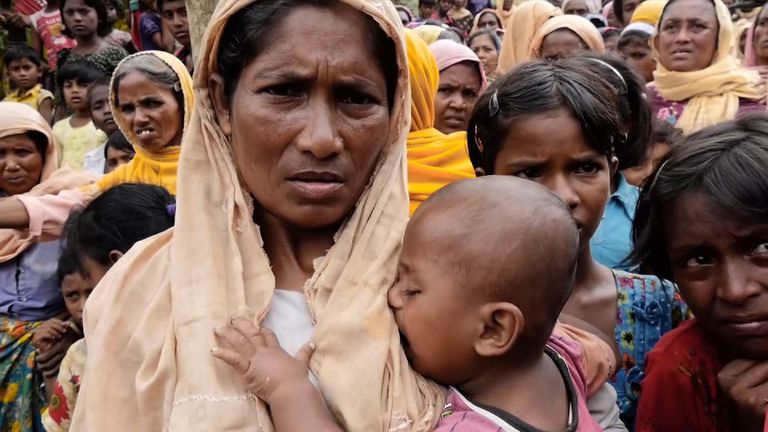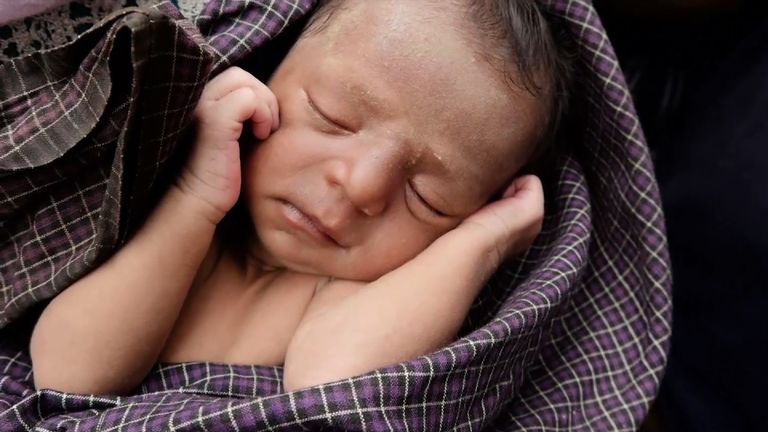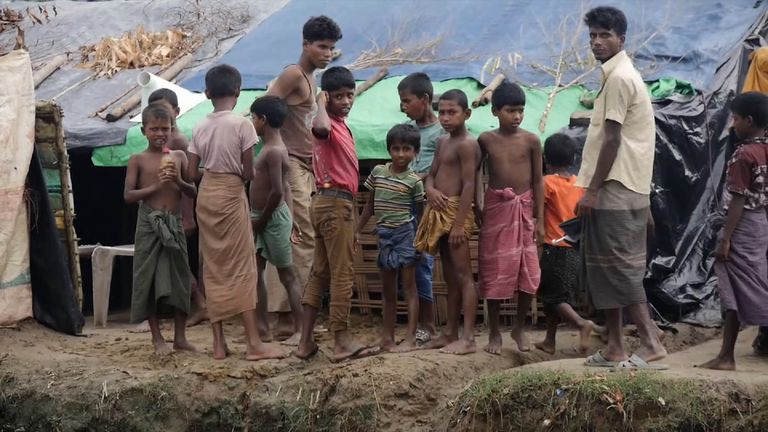Rohingyas flee Myanmar: 'All hell breaks loose in makeshift camps'
Sky's Ashish Joshi says aid distribution is haphazard amid a "lack" of a major international presence on the ground in Bangladesh.
Tuesday 12 September 2017 08:55, UK
More than 300,000 Rohingya Muslims have fled to Bangladesh following a two-week surge in violence in majority Buddhist Myanmar, formerly Burma.
Aid officials said refugee camps in the neighbouring country were reaching capacity, as fleeing Rohingyas claimed security forces and Buddhist mobs in Rakhine state had attacked them and set fire to their homes.
The violence began on 25 August, when an ethnic Rohingya insurgent group attacked police posts in Myanmar and security forces retaliated.
The UN has condemned what it called a cruel military operation against the minority community and said it appeared to be a "textbook example of ethnic cleansing".
But the Myanmar government has dismissed the Rohingya claims, with leader Aung San Suu Kyi blaming fake news and a misinformation campaign.
Foreign Secretary Boris Johnson has joined the chorus of criticism against her and the military.
He said: "There can be no doubt the treatment of the Rohingya is a disgrace and I'm afraid it is damaging the reputation of Burma.
"All of us that wish Aung San Suu Kyi well... hope she will be able to use her leadership to get the military to do the right thing for that beleaguered and oppressed minority."
At a camp, the scene is one of utter chaos, with hundreds of people pushing and shoving.
The aid workers shout, trying to keep order. Some are wielding large sticks and threatening to whip the refugees into line.
Empty threat or not, it has little effect. These people are too desperate to care.
Screaming babies add to the cacophony; the sound of hunger.
I am just outside the Balokhali camp, about a 90-minute drive from Cox's Bazar, and in front of me are hundreds of women, all in brightly-coloured saris. They look slightly incongruous against their stark surroundings.
All are newly arrived Rohingyas. We are inside a makeshift aid distribution centre, which sounds organised and official but is anything but. It is simply a clay square on the side of a paddy field.
This is one of the few open spaces that has not been filled up with rickety tarpaulin-covered shelters for the tens of thousands of Rohingya refugees who arrive every day.
Waiting with the others I see a woman cradling a young baby. I am told by Zoora Khatun that her daughter Murzia is just two days old; a child of the conflict.
She said: "I was escaping from my village. I had been walking for five days and went into labour. A stranger let me stay in his house to deliver my baby. After she was born I made my way to the camp."
Ms Khatun is clutching a small packet of biscuits. She tells me that is all she has been given to eat since she arrived.
Baby Murzia has not seen a doctor since she was born; her mother says she was turned away from a medical centre because it was too busy.
Suddenly, a fight breaks out. Some aid has been thrown into the crowd, sparking a fierce battle between many grabbing hands, all tearing and pulling at the package. This is what starvation does.
In the melee we see Shakin, an elderly woman. Her frail frame is being tossed and buffeted by the fighting crowd. Her grandson does his best to protect her but even he is finding it difficult to stay upright. All hell is breaking loose.
I learn Shakin is 80 years old. She is exhausted by her long, difficult journey across the border from Myanmar into Bangladesh.
I can hardly hear her; her voice is more like a deep gasp for air. She manages to tell me she saw her nephew killed and her home torched.
More than 300,000 Rohingya have fled to Bangladesh in the past few weeks. That's 300,000 destitute people who need food, water, shelter, clothing and aid.
But I have not seen a large-scale international aid presence operating here on the ground. I have a seen a Medecins Sans Frontieres camp. And I have seen the distinctive white 4x4 SUVs with the UN logo emblazoned on the side.
The only aid distribution I have seen is thrown from passing trucks. It is much-needed food and clothing collected by well-intentioned locals but it reduces the refugees to begging for scraps and fighting among themselves. It is haphazard and uncontrolled.
Only the fittest and strongest will manage to grasp and hold unto what has been jettisoned.
Some volunteers are trying to be more organised.
Muhammad Kapiluddin and his friends are all young professional Bangladeshis who have banded together to bring donations to makeshift camps. The packets they hand out contain paracetamol, puffed rice and other dried foods.
"I haven't seen any international NGOs here. They need to come quickly," he said. "I don't know why they are not here. These people need help."
The plight of the Rohingya refugees might worsen.
Tens of thousands more inside Myanmar are said to be on the move, making their way here to Bangladesh.
That means more hungry mouths to feed - and nobody to feed them.
